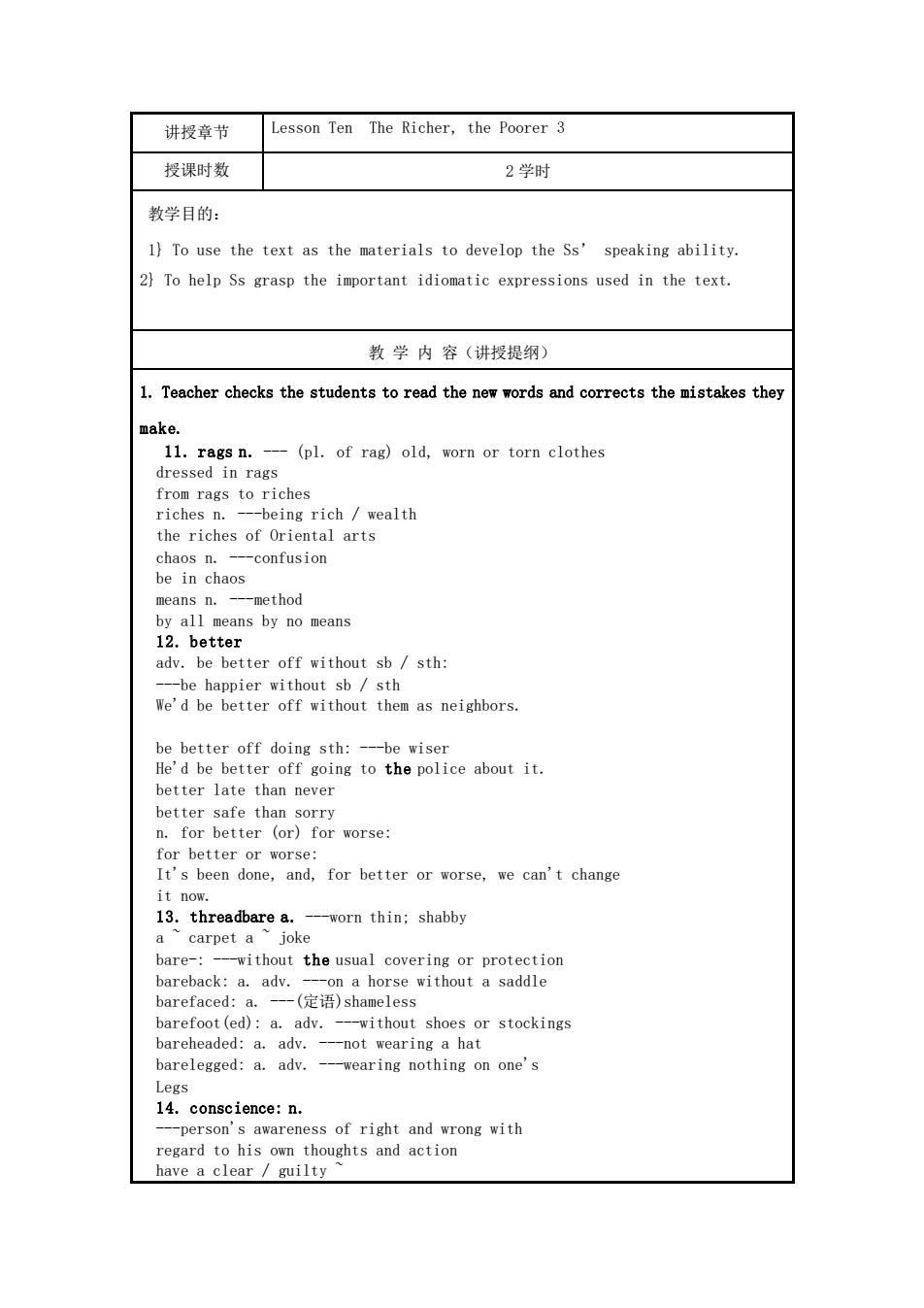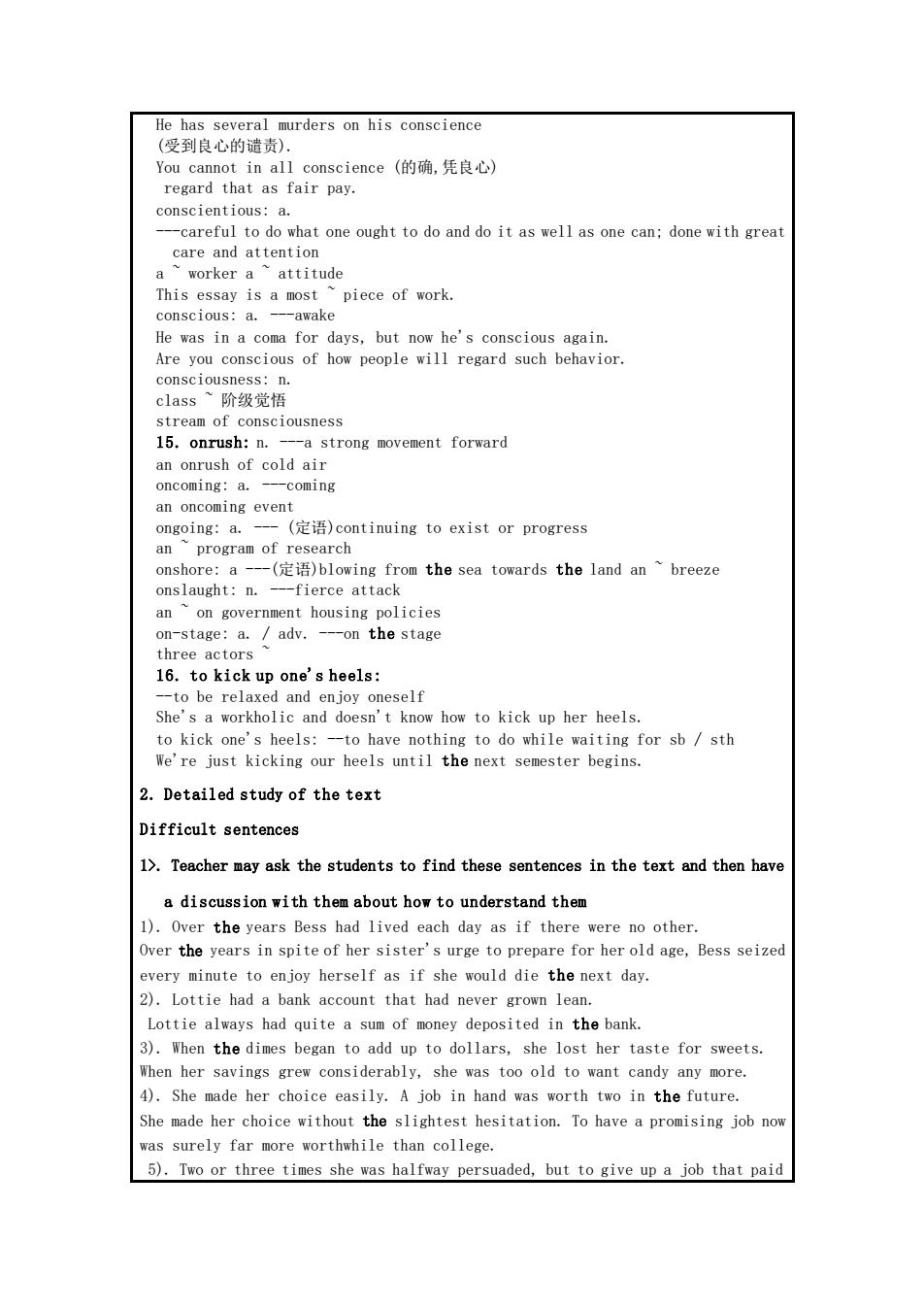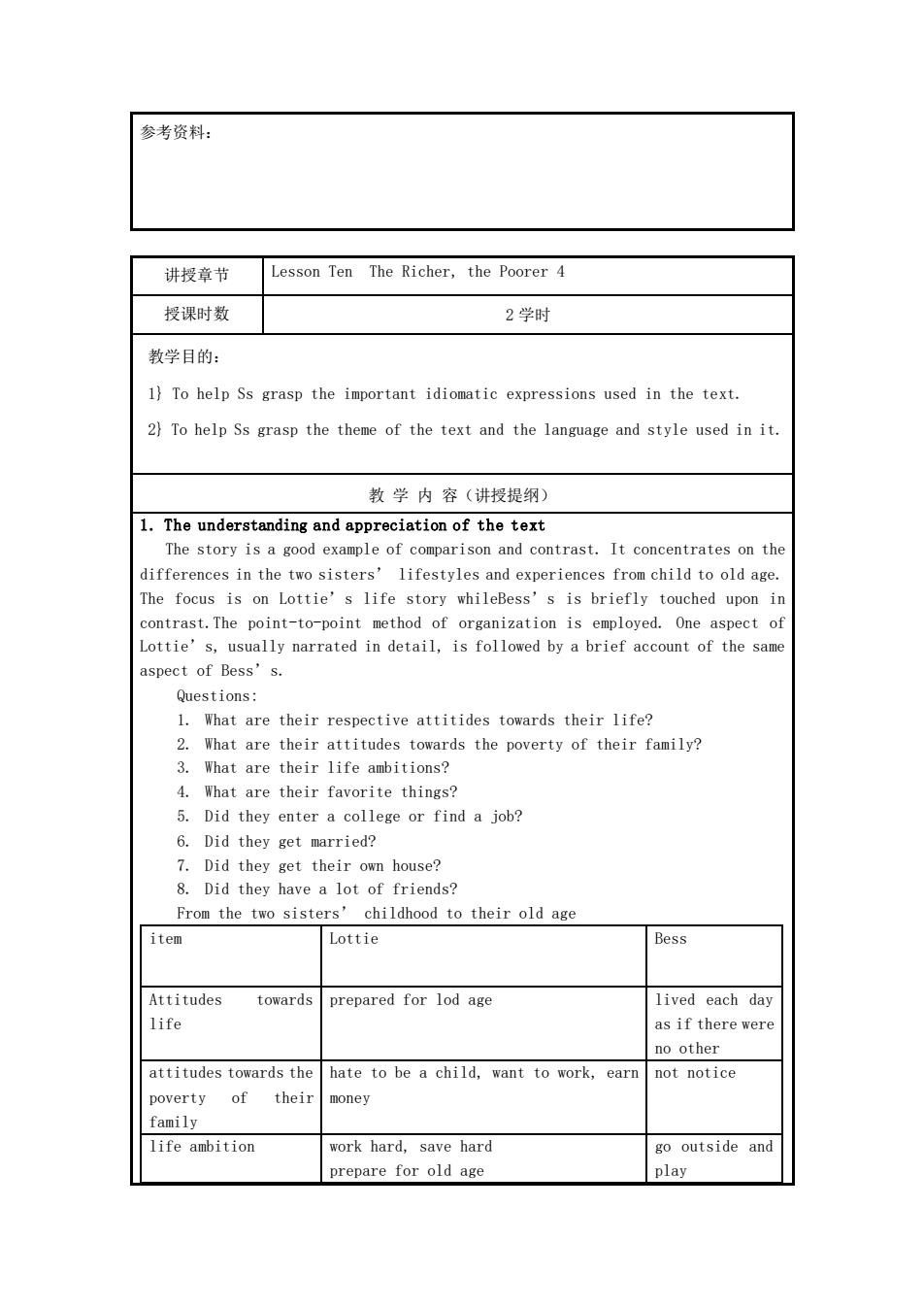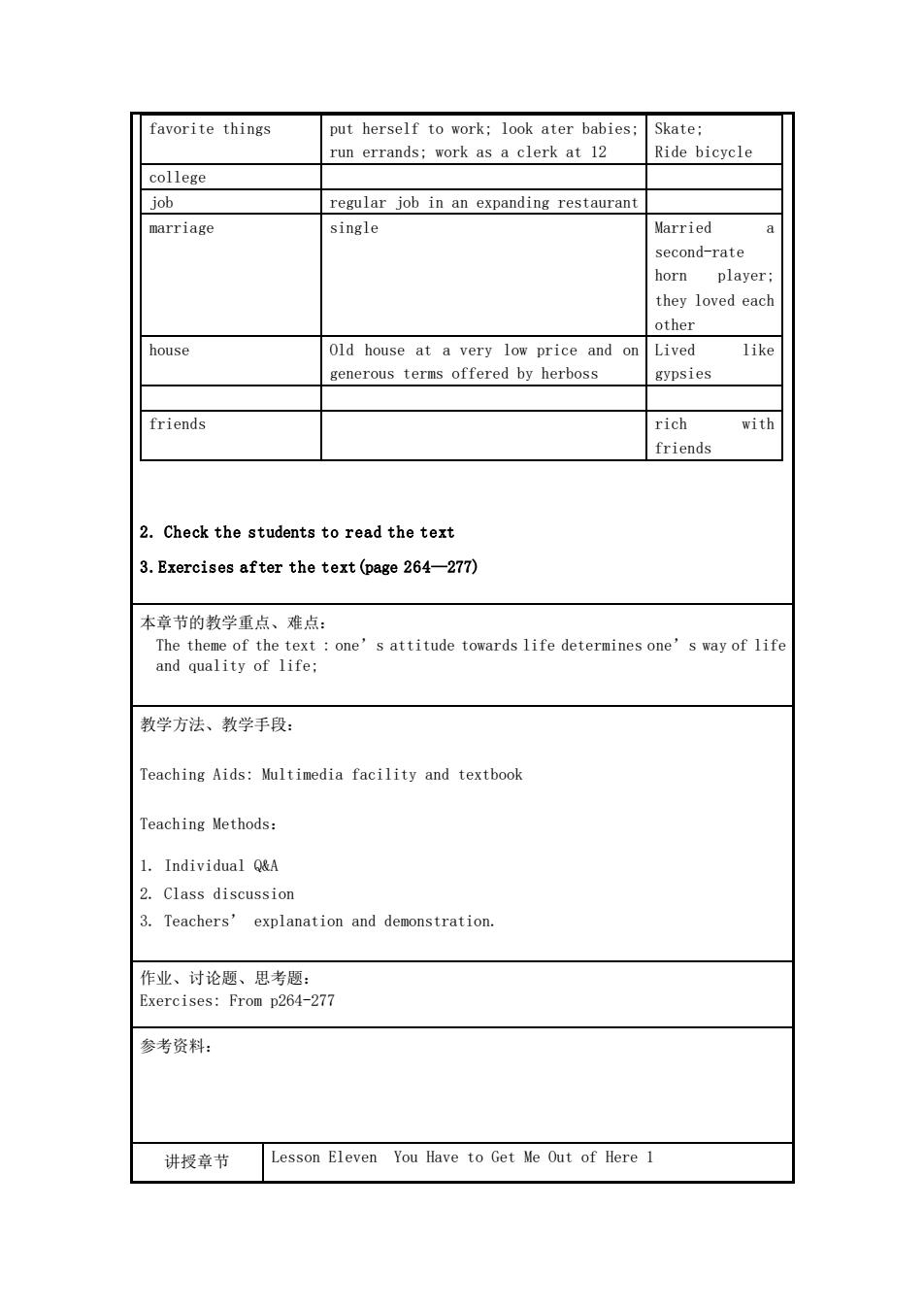
讲授章节 Lesson Ten The Richer,the Poorer 3 授课时数 2学时 教学目的: 1}To use the text as the materials to develop the Ss'speaking ability 2)To help Ss grasp the important idiomatic expressions used in the text. 教学内容(讲授提纲) 1.Teacher checks the students to read the new words and corrects the mistakes they make. 11.rags n. (pl.of rag)old,worn or torn clothes -being rich wealth the riches of oriental arts chaos n.-confusion be in chaos means n. -method a北a7的m adv.be better off without sb/sth: hem as neighbors be better off doing sth:-be wise He'd be better off going to the police about it. better late than never better safe than sorry n.for better (or)for worse: for better or worse It's been done,and,for better or worse,we can't change -worn thin:shabby arpe bare- ba. -(定语)shameless barefoot(ed):a.adv.-without shoes or stockings bareheaded:a.adv.-not wearing a hat barelegged:a.adv. -wearing nothing on one's Legs 14.conscience:n. r awareness of righ wrong with rega
讲授章节 Lesson Ten The Richer, the Poorer 3 授课时数 2 学时 教学目的: 1} To use the text as the materials to develop the Ss’ speaking ability. 2} To help Ss grasp the important idiomatic expressions used in the text. 教 学 内 容(讲授提纲) 1. Teacher checks the students to read the new words and corrects the mistakes they make. 11. rags n. - (pl. of rag) old, worn or torn clothes dressed in rags from rags to riches riches n. -being rich / wealth the riches of Oriental arts chaos n. -confusion be in chaos means n. -method by all means by no means 12. better adv. be better off without sb / sth: -be happier without sb / sth We'd be better off without them as neighbors. be better off doing sth: -be wiser He'd be better off going to the police about it. better late than never better safe than sorry n. for better (or) for worse: for better or worse: It's been done, and, for better or worse, we can't change it now. 13. threadbare a. -worn thin; shabby a ~ carpet a ~ joke bare-: -without the usual covering or protection bareback: a. adv. -on a horse without a saddle barefaced: a. -(定语)shameless barefoot(ed): a. adv. -without shoes or stockings bareheaded: a. adv. -not wearing a hat barelegged: a. adv. -wearing nothing on one's Legs 14. conscience: n. -person's awareness of right and wrong with regard to his own thoughts and action have a clear / guilty ~

He has several murders on his conscience (受到自心的曹贵) You cannot in all conscience(的确,凭良心) regard that as fair pay. conscientious:a. -careful to do what one ought to do and do it as well as one can:done with great care and attention worker attitude is a most piece of work He was in a coma for days,but now he's conscious again. Are you conscious of ho such behavior consciousness'n class~阶级觉悟 stream of consciousness 15.onrush:n. a strong movement forward an onrush of cold air oncoming:a. coming an oncoming even ongoing:a m of re )blowing from the sea towards the land an breeze onslaught:n-fierce attack an on government housing policies on-stage:a.adv.-on the stage three actors 16.to kick up one's heels: lic and doesn't know how to kick up her heels. 1s: 2.Detailed study of the tex Difficult sentences 1>.Teacher may ask the students to find these sentences in the text and then have a discussion with them about how to understand them 1.Over the years Bess had lived each day as if there ere no othe Over the years in spite of her sister's urge to prepare for her old age,Bess seize every minute to enjoy herself as if she would die the next day. 2).Lottie had a bank account that had never grown lean. lottie always had quite a sum of money deposited in the bank 3).When the dimes began to add up to dollars she lost her taste for sweets er savings gres considerably,she was too old to want cand any more. 4).She made her choice easily.A job in hand was worth two in the future. She made her choice without the slightest hesitation.To have a promising job now was surely far more worthwhile than college. 5).Two or three times she was halfway persuaded,but to give up a job that paid
He has several murders on his conscience (受到良心的谴责). You cannot in all conscience (的确,凭良心) regard that as fair pay. conscientious: a. -careful to do what one ought to do and do it as well as one can; done with great care and attention a ~ worker a ~ attitude This essay is a most ~ piece of work. conscious: a. -awake He was in a coma for days, but now he's conscious again. Are you conscious of how people will regard such behavior. consciousness: n. class ~ 阶级觉悟 stream of consciousness 15. onrush: n. -a strong movement forward an onrush of cold air oncoming: a. -coming an oncoming event ongoing: a. - (定语)continuing to exist or progress an ~ program of research onshore: a -(定语)blowing from the sea towards the land an ~ breeze onslaught: n. -fierce attack an ~ on government housing policies on-stage: a. / adv. -on the stage three actors ~ 16. to kick up one's heels: -to be relaxed and enjoy oneself She's a workholic and doesn't know how to kick up her heels. to kick one's heels: -to have nothing to do while waiting for sb / sth We're just kicking our heels until the next semester begins. 2. Detailed study of the text Difficult sentences 1>. Teacher may ask the students to find these sentences in the text and then have a discussion with them about how to understand them 1). Over the years Bess had lived each day as if there were no other. Over the years in spite of her sister's urge to prepare for her old age, Bess seized every minute to enjoy herself as if she would die the next day. 2). Lottie had a bank account that had never grown lean. Lottie always had quite a sum of money deposited in the bank. 3). When the dimes began to add up to dollars, she lost her taste for sweets. When her savings grew considerably, she was too old to want candy any more. 4). She made her choice easily. A job in hand was worth two in the future. She made her choice without the slightest hesitation. To have a promising job now was surely far more worthwhile than college. 5). Two or three times she was halfway persuaded, but to give up a job that paid

well for a homemaking job that paid nothing was a risk she was incapable of taking. three tims,rged by others,she thouht seriously but she didn't because that would mean she had to give up a well-paying job and become a housewife homemaker who didn't get paid or all the work she did.This was something she couldn't make herself accented. 6).They were often in rags and never in riches.They were often poor and never had much money. 7).Very likely she would have dumped them on Lottie's doorstep. If she had had children,she would very probably have left them with Lottie. 8).The years,after forty,began to race. After one reached forty, one grew old rapidly. )trapped bythe blodt kew she would have tosend Bess her home. Though she always disproved of Bess's way of life,she was well aware that as sisters they were closely related.She knew that she would have to help her out by sending money for her journey home. 10).Don'tcount the years that left us.At our time of lifeit's the days that count Don't try to figure out how many years we are going to live.At our age,we must live in terms of days,not years,and spend each day joyfully. 本章节的教学重点、难点: 1.Vocabulary:prepare for,run errands for,ambition,frugal,humble,indulge intolerable,lavish,sentimental,smart (v.)quit,marvel at. 2.Adverbial expressions of frequency; 教学方法、教学手段: Teaching Aids:Multimedia facility and textbook Teaching Methods 1.Individual Q&A 2.Class discussion 3.Teachers'explanation and demonstration. 作业、讨论题、思考颗, ercises:From p264-277
well for a homemaking job that paid nothing was a risk she was incapable of taking. Two or three times, urged by others, she thought seriously about marrying, but she didn't because that would mean she had to give up a well-paying job and become a housewife / homemaker who didn't get paid or all the work she did. This was something she couldn't make herself accepted. 6). They were often in rags and never in riches. They were often poor and never had much money. 7). Very likely she would have dumped them on Lottie's doorstep. If she had had children, she would very probably have left them with Lottie. 8). The years, after forty, began to race. After one reached forty, one grew old rapidly. 9). Lottie, trapped by the blood tie, knew she would have to send Bess money to bring her home. Though she always disproved of Bess's way of life, she was well aware that as sisters they were closely related. She knew that she would have to help her out by sending money for her journey home. 10). Don't count the years that left us. At our time of life it's the days that count. Don't try to figure out how many years we are going to live. At our age, we must live in terms of days, not years, and spend each day joyfully. 本章节的教学重点、难点: 1. Vocabulary: prepare for, run errands for, ambition, frugal, humble, indulge, intolerable, lavish, sentimental, smart (v.) quit, marvel at. 2. Adverbial expressions of frequency; 教学方法、教学手段: Teaching Aids: Multimedia facility and textbook Teaching Methods: 1. Individual Q&A 2. Class discussion 3. Teachers’ explanation and demonstration. 作业、讨论题、思考题: Exercises: From p264-277

参考资料: 讲授章节 Lesson Ten The Richer,the Poorer 4 授课时数 2学时 教学目的: 1}To help Ss grasp the important idiomatic expressions used in the text. 2)To help Ss grasp the theme of the text and the language and style used in it. 教学内容(讲授提纲) 1.The understanding and appreciation of the text The story is a good exampl parison and contrast.It concentrates on th differences in the two sisters'lifestyles and experiences from child to old age The focus is on Lottie's life story whileBess's is briefly touched upon in contrast.The point-to-point method of organization is employed.One aspect of Lottie's,usually narrated in detail,is followed by a brief account of the same aspect of Bess's. Questions: 1.What are their respective attitides towards their life? 2.What are their attitudes towards the poverty of their family? 3.What are their life ambitions? 4.What are their favorite things? 5.Did they enter a college or find a job? 6.Did they get married? 7.Did they get their own house? 8.Did they have a lot of friends? From the two sisters'childhood to their old age item Lottie Bess Attitudes towards prepared for lod age lived each day life as if there were no other attitudes towards the hate to be a child,want to work,earn not notice poverty of their money family life ambition work hard save hard go outside and prepare for old age play
参考资料: 讲授章节 Lesson Ten The Richer, the Poorer 4 授课时数 2 学时 教学目的: 1} To help Ss grasp the important idiomatic expressions used in the text. 2} To help Ss grasp the theme of the text and the language and style used in it. 教 学 内 容(讲授提纲) 1. The understanding and appreciation of the text The story is a good example of comparison and contrast. It concentrates on the differences in the two sisters’ lifestyles and experiences from child to old age. The focus is on Lottie’s life story whileBess’s is briefly touched upon in contrast.The point-to-point method of organization is employed. One aspect of Lottie’s, usually narrated in detail, is followed by a brief account of the same aspect of Bess’s. Questions: 1. What are their respective attitides towards their life? 2. What are their attitudes towards the poverty of their family? 3. What are their life ambitions? 4. What are their favorite things? 5. Did they enter a college or find a job? 6. Did they get married? 7. Did they get their own house? 8. Did they have a lot of friends? From the two sisters’ childhood to their old age item Lottie Bess Attitudes towards life prepared for lod age lived each day as if there were no other attitudes towards the poverty of their family hate to be a child, want to work, earn money not notice life ambition work hard, save hard prepare for old age go outside and play

favorite things put herself to work;look ater babies: Skate run errands:work as a clerk at 12 Ride bicycle college job regular job in an expanding restaurant marriage single Married second-rate horn player they loved each other house Old house at a very low price and onLived like generous terms offered by herboss gypsies friends rich with friends 2.Check the students to read the text 3.Exercises after the text(page 264-277) 本章节的教学重点、难点: The theme of the text:one's attitude towards life determines one's way of life and quality of life: 教学方法、教学手段: Teaching Aids:Multimedia facility and textbook Teaching Methods: 1.Individual Q&A 2.Class discussion 3.Teachers'explanation and demonstration. 作业、讨论题、思考题: Exercises:From p264-277 参考资料: 讲授章节Lesson Eleven You Have to Get Me Out of Here1
favorite things put herself to work; look ater babies; run errands; work as a clerk at 12 Skate; Ride bicycle college job regular job in an expanding restaurant marriage single Married a second-rate horn player; they loved each other house Old house at a very low price and on generous terms offered by herboss Lived like gypsies friends rich with friends 2. Check the students to read the text 3.Exercises after the text(page 264—277) 本章节的教学重点、难点: The theme of the text : one’s attitude towards life determines one’s way of life and quality of life; 教学方法、教学手段: Teaching Aids: Multimedia facility and textbook Teaching Methods: 1. Individual Q&A 2. Class discussion 3. Teachers’ explanation and demonstration. 作业、讨论题、思考题: Exercises: From p264-277 参考资料: 讲授章节 Lesson Eleven You Have to Get Me Out of Here 1